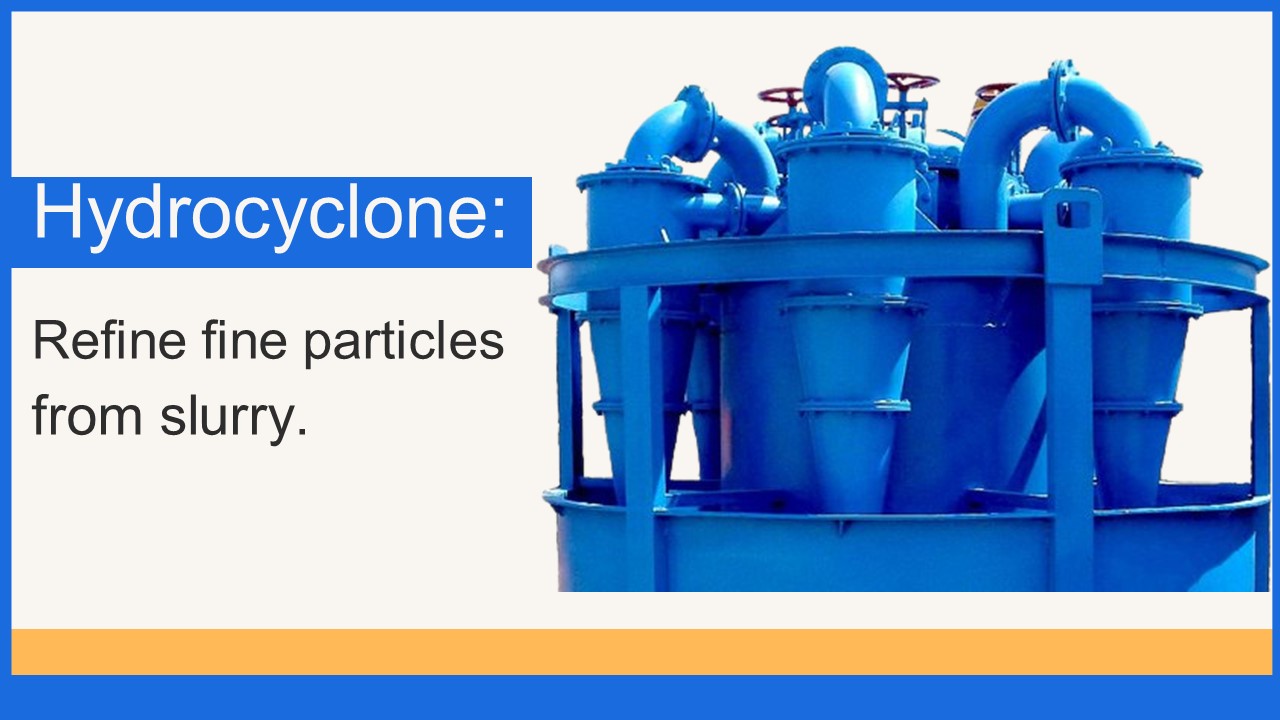Hydrocyclone: Refine fine particles from slurry PowerPoint PPT Presentation
Title: Hydrocyclone: Refine fine particles from slurry
1
Hydrocyclone Refine fine particles from slurry.
2
WHAT IS HYDROCYCLONE?
It is mainly equipment that uses fluid pressure
to centrifugal forces to generate centrifugal
force. In simple words, it mainly works on the
principle of weight variations like particles
that are smaller in size and have a specific
gravity and which have higher size have a
specific gravity.
3
HYDROCYCLONE DIAGRAM
4
TYPES OF HYDROCYCLONES
- XCI Hydrocyclone - It has an improved feeding and
desilting throat that provides an extra benefit. - XCII Hydrocyclone- It has an involute type of
throat, which increases the centrifugal force to
feed the granule. - XCIII Hydrocyclone- It is equipped with a special
fishtail device at the desilting throat. that
adjusts the lower level of flow concentration - XCIV Hydrocyclone- It has a sophisticated
structure and a desilting throat-tightening tube
that is adjustable. The length of the desilting
site can be altered or determined by the
tightening area.
5
FACTORS EFFECTING THE PROCESS
- Size The hydrocyclone's size determines how much
centrifugal force it will produce, with a smaller
hydrocyclone producing finer cut-size particles
and a larger hydrocyclone generating low-density
particles. - Flow Rate A lower flow rate leads in something
like a wider separation, whereas an increase in
flow results in a greater number of finer
separations. - Inlet Size Larger the size of the inlet more
will be the capacity and the smaller the size
will decrease the overall capacity. - Vortex Finder More the size of the vortex more
will be the wider separation of the particles
whereas the smaller the size will provide more
finite particles. - Underflow Diameter If the hydrocyclone's
diameter is not appropriately calculated with
respect to tones per hour, the results may suffer.
6
INDUSTRIES USING HYDROCYCLONE PROCESS
- There are many industries that use separation
technology, - Hard Rocks
- Sand
- Coal
- Industrial Minerals
- Other mining Industries.
7
USES
- To separate sand and tiny particles, it is
employed in the paper and pulp industries or
mills. - used in the oil business or in mills to separate
oil from water or water from oil - In the iron industry, it is employed to separate
cooling liquid from metal components. - It is utilized in the concentration and
refinement of starch slurries in the industries
that generate starch. - It is also used in the food processing industry.
8
ADVANTAGES
- A low initial investment is required.
- Increases flow rate volume
- Higher Efficiency
- High Versatility
- Lower Maintenance Charges
- High Durability.
9
DISADVANTAGES
- Higher Operating costs due to pressure drop.
- Unable to regulate viscous flow
- A limited number of microalgal strains
- Unable to produce completely dry underflow
- Higher Probability of clogging the dust outlet
10
CONCLUSION
Manufactured with advanced engineering and
equipment matching the industry norms,
Hydrocyclones are great industrial equipment that
helps to cater the different mining industries
and food industries. With the involvement of the
different types of hydrocyclones it has evolved
to meet the different needs of different
situations. Every equipment or machine goes
through a deteriorating phase due to internal
wear and tear but if maintained properly it can
have the great added advantage to your overall
business.
11
THANK YOU

